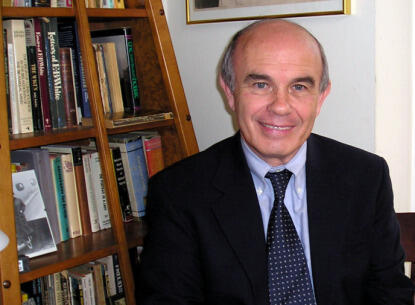
April 29, 2013
'F. Scott Fitzgerald in Context': An interview with scholar Bryant Mangum
Share this story
Bryant Mangum, professor of English in the College of Humanities and Sciences at VCU, released his latest book, “F. Scott Fitzgerald in Context” (New York: Cambridge University Press), in March. “F. Scott Fitzgerald in Context” is a collection of essays that highlights how the works of Fitzgerald depict the Zeitgeist of the 1920s and 1930s.
Since 1972, Mangum has led VCU graduate and undergraduate seminars on Fitzgerald, Hemingway, Salinger and The New Yorker magazine and taught courses including “Contemporary American Literature” and “Early Twentieth Century American Literature.” He is a recipient of the VCU Distinguished Teaching Award, a VCU Board of Visitors Teaching Fellowship, the Elske v.P. Smith Distinguished Lecturer Award, the Virginia State Council of Higher Education Outstanding Faculty Award and the South Atlantic Modern Language Association Outstanding Teaching Award.
Mangum is also the editor of Modern Library’s “The Best Early Stories of F. Scott Fitzgerald” and author of “A Fortune Yet: Money in the Art of F. Scott Fitzgerald’s Short Stories.”
Will you describe the process involved in editing “F. Scott Fitzgerald in Context?”
When the acquisitions editor at Cambridge University Press approached me about editing the volume, I wrote an 80-page proposal in which I detailed the contexts that would be explored in the individual chapters. The proposal went out to three anonymous readers chosen by Cambridge, each of whom endorsed the project. Once the project was accepted, I began to think about contributors, and came to the conclusion that the volume would have strong representation from the group of Fitzgerald scholars who have been working in the field for many years, but that the work of these scholars should be balanced as evenly as possible by the ideas of emerging scholars. I created a list of scholars, and contacted each of them individually. To my good fortune, virtually all of them agreed to write a chapter. Almost a year later, I received chapters from forty individual scholars. I performed substantive edits on each of them, and then copy-edited them, and then finally proofread them. Each chapter went through at least three editorial “passes” before the process was complete. In addition to the aforementioned editorial processes, I wrote the preface to the volume and two of the chapters. I also located and garnered permissions for ten photographs as well as created the index.
This book covers many contexts related to the 1920s and 1930s ranging from prohibition to the postwar flapper. How are these contexts relevant to Fitzgerald’s work?
These contexts in the book are relevant to Fitzgerald’s work because Fitzgerald defined the Jazz Age and chronicled two of the most exciting, complex and turbulent eras in American history: the Jazz Age and the Great Depression. For example, he wrote extensively about the burgeoning youth culture of the 1920s as well as the gender norms and fashions of the period. With regard to the 1930s, he wrote a novel as well as numerous stories that reflect the ways in which the producers and writers of the Golden Age of Hollywood conducted their personal and professional lives. Ultimately, Fitzgerald has become virtually inseparable from the culture in which he lived and of which he wrote.
You have written a book on Fitzgerald and edited a collection of Fitzgerald’s stories for the Modern Library. What sparked your interest in Fitzgerald?
One critic has remarked that “Fitzgerald had a style that was impossible to imitate but from which much could be learned.” I admire those qualities of his style that are impossible to imitate — and, in fact, nearly impossible to name or define — but which are in evidence in virtually everything he wrote. As Dorothy Parker once said, “Fitzgerald could write a bad story, but he could not write badly.” I take this to mean, in part, that his writing has a beautiful lyricism that qualifies as “prose genius.” Part of that genius reflects what Fitzgerald himself defined (though not in direct reference to himself) as the test of a first-rate intelligence: the ability to hold two ideas in the mind at the same time and still retain the ability to function. Fitzgerald’s insights into the human condition and his lyrical prose sparked my interest in his life and works, and they are two of the primary reasons that I, among many others, consider him one of the greatest writers of the Modernist period.
Who do you consider to be the audience for "F. Scott Fitzgerald in Context?"
The book is designed as a resource for Fitzgerald scholars, as well as for instructors and graduate or advanced undergraduate students conducting research on Fitzgerald and/or the literature and culture of the Jazz Age and Depression eras.
Are you considering any other book projects?
I am currently putting together an edition of short stories of The New Yorker writer Alice Adams. The stories in the volume are all set in Chapel Hill, N.C., a setting referred to as Hilton in many of her works. I am in the process of acquiring permissions to reprint her works.
Subscribe for free to the weekly VCU News email newsletter at http://newsletter.news.vcu.edu/ and receive a selection of stories, videos, photos, news clips and event listings in your inbox every Thursday.
Subscribe to VCU News
Subscribe to VCU News at newsletter.vcu.edu and receive a selection of stories, videos, photos, news clips and event listings in your inbox.







